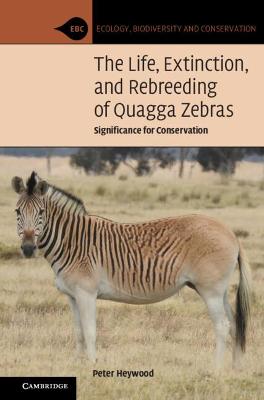Ecology, Biodiversity and Conservation
1 total work
Quaggas were beautiful pony-sized zebras in southern Africa that had fewer stripes on their bodies and legs, and a browner body coloration than other zebras. Indigenous people hunted quaggas, portrayed them in rock art, and told stories about them. Settlers used quaggas to pull wagons and to protect livestock against predators. Taken to Europe, they were admired, exhibited, harnessed to carriages, illustrated by famous artists and written about by scientists. Excessive hunting led to quaggas' extinction in the 1880s but DNA from museum specimens showed rebreeding was feasible and now zebras resembling quaggas live in their former habitats. This rebreeding is compared with other de-extinction and rewilding ventures and its appropriateness discussed against the backdrop of conservation challenges—including those facing other zebras. In an Anthropocene of species extinction, climate change and habitat loss which organisms and habitats should be saved, and should attempts be made to restore extinct species?
